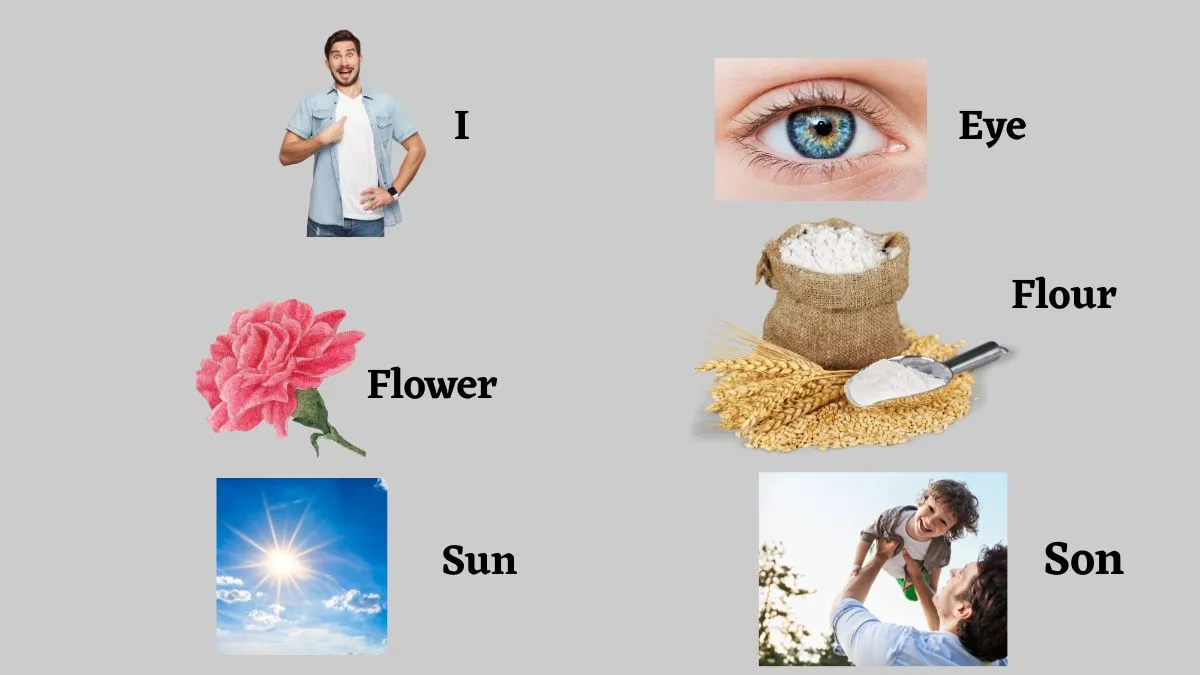- By Aditi Priya Singh
- Wed, 27 Aug 2025 06:34 PM (IST)
- Source:JND
40+ Similar Sounding Words: The English language is full of fascinating words, but one of the most perplexing things for learners is when two words sound the same but have entirely different spellings and meanings. We call these words homophones. Particularly for novices, they can make speaking, writing and even reading difficult. For instance, the words son (a male child) and sun (the star that provides us with light) have the same sound, but they are written differently and have quite different meanings.
Since we frequently use homophones without even realising it, they are an essential component of everyday English. Common examples include words like pair and pear, sea and see, and right and write. Carelessness can lead to the use of incorrect spelling, which completely alters a sentence's meaning.
40+ Words With Same Sound But With Different Spellings and Meanings
By learning and practising these words, you can improve your vocabulary, avoid confusion, and write more confidently. In this article, we have listed 40+ words with the same pronunciation but different spellings and meanings to make learning simple and fun for you.
| S.N. | Word 1 (Meaning) | Word 2 (Meaning) |
|---|---|---|
| 1. | Bear (animal) | Bear (to tolerate) |
| 2. | Right (correct) | Write (to put words on paper) |
| 3. | Mail (letters, parcels) | Male (gender) |
| 4. | See (to look) | Sea (large water body) |
| 5. | Eye (organ of sight) | I (self) |
| 6. | Sun (star) | Son (male child) |
| 7. | Flower (blossom) | Flour (powder for baking) |
| 8. | Knight (warrior) | Night (opposite of day) |
| 9. | Peace (harmony) | Piece (a part) |
| 10. | Two (number) | Too (also), To (preposition) |
| 11. | Weak (not strong) | Week (seven days) |
| 12. | Plain (simple / flatland) | Plane (aircraft) |
| 13. | Deer (animal) | Dear (loved one) |
| 14. | Brake (to stop) | Break (to shatter or rest) |
| 15. | Buy (purchase) | By (near, through), Bye (farewell) |
| 16. | Cell (small unit, jail) | Sell (to trade) |
| 17. | Pair (two things) | Pear (fruit) |
| 18. | Here (this place) | Hear (to listen) |
| 19. | Hole (gap) | Whole (complete) |
| 20. | Hour (time) | Our (belonging to us) |
| 21. | Meat (flesh) | Meet (to come together) |
| 22. | Wear (to dress) | Where (place) |
| 23. | Rain (water drops) | Reign (rule), Rein (horse control) |
| 24. | Allowed (permitted) | Aloud (spoken loudly) |
| 25. | Some (a few) | Sum (total) |
| 26. | Sole (only / shoe bottom) | Soul (spirit) |
| 27. | Stationary (not moving) | Stationery (paper, pens) |
| 28. | Wait (stay) | Weight (heaviness) |
| 29. | Die (to stop living) | Dye (to colour) |
| 30. | Principal (head of school) | Principle (rule, belief) |
| 31. | Fair (just / carnival) | Fare (ticket price) |
| 32. | Tail (part of an animal) | Tale (story) |
| 33. | Morning (early day) | Mourning (expressing grief) |
| 34. | Pail (bucket) | Pale (light colour, weak) |
| 35. | Road (path) | Rode (past of ride) |
| 36. | Steal (take without permission) | Steel (metal) |
| 37. | Sight (vision) | Site (location) |
| 38. | Vain (proud, useless) | Vein (blood vessel), Vane (weather tool) |
| 39. | Weather (climate) | Whether (if) |
| 40. | Knew (past of know) | New (fresh, recent) |
| 41. | Write (to compose) | Rite (ritual), Right (correct, direction) |
| 42. | Made (created) | Maid (domestic helper) |

